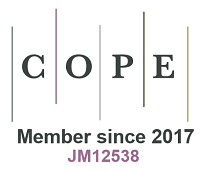Assessing the Effect of Geometric Design and Land Use on Roundabouts Using Video Camera
Abstract
Â
Doi: 10.28991/CEJ-2024-010-11-012
Full Text: PDF
Keywords
References
Almoarawi, M., & Dabbour, E. (2018). Predicting Operating Speeds at Urban Multilane Roundabouts in Abu Dhabi, United Arab Emirates. Journal of Advanced Transportation, 2018, 1–10. doi:10.1155/2018/8363064.
Woodmansey, A., & Spalding, K. (2012). Montana's Roundabout Corridor. Public roads, 75(4), 8-11.
Gallelli, V., Guido, G., Vitale, A., & Vaiana, R. (2019). Effects of calibration process on the simulation of rear-end conflicts at roundabouts. Journal of Traffic and Transportation Engineering, 6(2), 175–184. doi:10.1016/j.jtte.2018.03.006.
Zubaidi, H. A., Anderson, J. C., & Hernandez, S. (2020). Understanding roundabout safety through the application of advanced econometric techniques. International Journal of Transportation Science and Technology, 9(4), 309–321. doi:10.1016/j.ijtst.2020.03.001.
Sacchi, E., Bassani, M., & Persaud, B. (2011). Comparison of Safety Performance Models for Urban Roundabouts in Italy and Other Countries. Transportation Research Record: Journal of the Transportation Research Board, 2265(1), 253–259. doi:10.3141/2265-28.
Lee, M. Y., & Park, B. H. (2016). Traffic Accident Model of Roundabout based on Type of Land Use. International Journal of Highway Engineering, 18(6), 153–160. doi:10.7855/ijhe.2016.18.6.153.
Antov, D., Abel, K., Sürje, P., Rõuk, H., & Rõivas, T. (2009). Speed reduction effects of urban roundabouts. Baltic Journal of Road and Bridge Engineering, 4(1), 22–26. doi:10.3846/1822-427X.2009.4.22-26.
Traffic Calming. (2007). Local Transport Note 1/07. Department for Transport, Department for Regional Development (Northern Ireland), Scottish Executives, Welsh Assembly Government, Belfast, Northern Ireland.
Perco, P., Marchionna, A., & Falconetti, N. (2012). Prediction of the operating speed profile approaching and departing intersections. Journal of Transportation Engineering, 138(12), 1476–1483. doi:10.1061/(ASCE)TE.1943-5436.0000471.
Hels, T., & Orozova-Bekkevold, I. (2007). The effect of roundabout design features on cyclist accident rate. Accident Analysis & Prevention, 39(2), 300–307. doi:10.1016/j.aap.2006.07.008.
Å urdonja, S., DragÄević, V., & Deluka-TibljaÅ¡, A. (2018). Analyses of maximum-speed path definition at single-lane roundabouts. Journal of Traffic and Transportation Engineering, 5(2), 83–95. doi:10.1016/j.jtte.2017.06.006.
Alshannaq, M., & Imam, R. (2020). Evaluating the safety performance of roundabouts. Transport Problems, 15(1), 141–152. doi:10.21307/TP-2020-013.
Akçelik, R. (2019). Gap Acceptance Cycles for Modelling Roundabout Capacity and Performance. Roundabouts as Safe and Modern Solutions in Transport Networks and Systems. TSTP 2018, Lecture Notes in Networks and Systems, 52, Springer, Cham, Switzerland. doi:10.1007/978-3-319-98618-0_8.
Al-Omari, B. H., Al-Masaeid, H. R., & Al-Shawabkah, Y. S. (2004). Development of a delay model for roundabouts in Jordan. Journal of Transportation Engineering, 130(1), 76–82. doi:10.1061/(ASCE)0733-947X(2004)130:1(76).
Akçelik, R., & Troutbeck, R. (2021). Implementation of the Australian roundabout analysis method in SIDRA. Highway Capacity and Level of Service, 17–34, Routledge, Milton Park, United Kingdom. doi:10.1201/9780203751916-2.
Wang, W., & Yang, X. (2012). Research on Capacity of Roundabouts in Beijing. Procedia - Social and Behavioral Sciences, 43, 157–168. doi:10.1016/j.sbspro.2012.04.088.
Al-Masaeid, H. R. (1999). Capacity and performance of roundabouts. Canadian Journal of Civil Engineering, 26(5), 597–605. doi:10.1139/l99-018.
Al-Masaeid, H. R., & Faddah, M. Z. (1997). Capacity of roundabouts in Jordan. Transportation Research Record, 1572, 76–85. doi:10.3141/1572-10.
Zirkel, B., Park, S., McFadden, J., Angelastro, M., & McCarthy, L. (2013). Analysis of sight distance, crash rate, and operating speed relationships for low-volume single-lane roundabouts in the United States. Journal of Transportation Engineering, 139(6), 565–573. doi:10.1061/(ASCE)TE.1943-5436.0000532.
Chen, Y., Persaud, B., Sacchi, E., & Bassani, M. (2013). Investigation of models for relating roundabout safety to predicted speed. Accident Analysis and Prevention, 50, 196–203. doi:10.1016/j.aap.2012.04.011.
Daniels, S., Brijs, T., Nuyts, E., & Wets, G. (2011). Extended prediction models for crashes at roundabouts. Safety Science, 49(2), 198–207. doi:10.1016/j.ssci.2010.07.016.
Al-Madani, H. M. N. (2003). Dynamic vehicular delay comparison between a police-controlled roundabout and a traffic signal. Transportation Research Part A: Policy and Practice, 37(8), 681–688. doi:10.1016/S0965-8564(03)00024-7.
Kehagia, F., Anagnostopoulos, A., Damaskou, E., & Mouratidis, A. (2022). An analysis on impact of geometric elements of multilane roundabouts on driver behavior. 6th International Symposium on Highway Geometric Design (ISHGD), 26-29 June, Amsterdam, Netherlands.
Berloco, N., Colonna, P., & Intini, P. (2022). The deviation angle for one-lane roundabouts: A general mathematical formulation and application. Journal of Traffic and Transportation Engineering, 9(1), 44–58. doi:10.1016/j.jtte.2020.10.006.
St»hle, L., & Wold, S. (1989). Analysis of variance (ANOVA). Chemometrics and Intelligent Laboratory Systems, 6(4), 259–272. doi:10.1016/0169-7439(89)80095-4.
Schober, P., & Schwarte, L. A. (2018). Correlation coefficients: Appropriate use and interpretation. Anesthesia and Analgesia, 126(5), 1763–1768. doi:10.1213/ANE.0000000000002864.
AASHTO. (2015). A Policy on Geometric Design of Highways and Streets. American Association of State Highway and Transportation Officials (AASHTO), Washington, United States.
Hossain, A., Sazid, A., & Hasan, R. (2024). Assessing Level of Service, Capacity and Future Optimization of Roundabouts in Rajshahi City Using Sidra Intersection. International Journal of Transportation Engineering and Technology, 10(1), 1–14. doi:10.11648/j.ijtet.20241001.11.
Gkyrtis, K., & Kokkalis, A. (2024). An Overview of the Efficiency of Roundabouts: Design Aspects and Contribution toward Safer Vehicle Movement. Vehicles, 6(1), 433–449. doi:10.3390/vehicles6010019.
Tumminello, M. L., Macioszek, E., & Granà , A. (2024). Insights into Simulated Smart Mobility on Roundabouts: Achievements, Lessons Learned, and Steps Ahead. Sustainability (Switzerland), 16(10), 4079. doi:10.3390/su16104079.
Li, L., Zhang, Z., Xu, Z. G., Yang, W. C., & Lu, Q. C. (2024). The role of traffic conflicts in roundabout safety evaluation: A review. Accident Analysis and Prevention, 196. doi:10.1016/j.aap.2023.107430.
Brewer, M. A., Fitzpatrick, K., Shirinzad, M., Zhou, H., Florence, D., Tydlacka, J. M., ... & Le, M. (2023). Research and Findings on Roundabouts and Innovative Intersections for High-Speed and Rural Locations. No. FHWA/TX-23/0-7036-R1. Texas A&M Transportation Institute, Texas, United States.
Suleiman, G., Younes, M. K., Ergun, M., Abushammala, M. F., & Aljaradin, M. (2024). Highlighting Traffic Accidents on Roundabouts Using MRSS- AHP Expert System. Civil Engineering Journal (Iran), 10(4), 1210–1220. doi:10.28991/CEJ-2024-010-04-013.
Pham, N. Q., & Nguyen, G. T. (2024). Assessing Air Quality Using Multivariate Statistical Approaches. Civil Engineering Journal (Iran), 10(2), 521–533. doi:10.28991/CEJ-2024-010-02-012.
Abdulkathum, S., Al-Shaikhli, H. I., Al-Abody, A. A., & Hashim, T. M. (2023). Statistical Analysis Approaches in Scour Depth of Bridge Piers. Civil Engineering Journal (Iran), 9(1), 143–153. doi:10.28991/CEJ-2023-09-01-011.
Bixhaku, M., Hoxha, G., & Duraku, R. (2023). Analysis of Perceptions of Cycling Safety on Roads with Mixed Traffic Depending on Age, Gender, and Riding Experience. Civil Engineering Journal, 9, 141–151. doi:10.28991/cej-sp2023-09-011.
Dabbour, E., Al Awadhi, M., Aljarah, M., Mansoura, M., & Haider, M. (2018). Evaluating safety effectiveness of roundabouts in Abu Dhabi. IATSS Research, 42(4), 274–283. doi:10.1016/j.iatssr.2018.04.003.
Angelastro, M. (2011). The influence of driver sight distance on crash rates and driver speed at modern roundabouts in the United States. Ph.D. Thesis, The State University of New Jersey, New Brunswick, United States.
Bassani, M., & Sacchi, E. (2011). Experimental investigation into speed performance and consistency of urban roundabouts: an Italian case study. 3rd International Conference on Roundabouts, Transportation Research Board, 18-20 May, Carmel, United States.
Kim, S., & Choi, J. (2013). Safety analysis of roundabout designs based on geometric and speed characteristics. KSCE Journal of Civil Engineering, 17(6), 1446–1454. doi:10.1007/s12205-013-0177-4.
DOI: 10.28991/CEJ-2024-010-11-012
Refbacks
- There are currently no refbacks.
Copyright (c) 2024 Bara' Al-Mistarehi, Rana Imam, Majdoleen Al-shawabkah, Amir Shtayat, Aslam Al-Omari

This work is licensed under a Creative Commons Attribution 4.0 International License.






